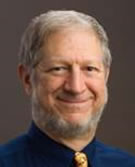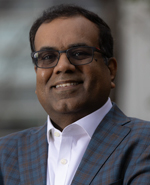THURSDAY KEYNOTE SPEAKER
 David Keyes David Keyes
King Abdullah University of Science and Technology (KAUST)
Title: For What the Bell Tolls
Abstract: With today’s exascale computers requiring 20 to 40 MW and some cloud centers exceeding 100MW, with no slacking of demand in sight, computing is a nonnegligible factor in climate change. For the past three years, we have been finalists in the Gordon Bell Prize with computations that do more with less – that scale up while squeezing out operations and data transfers that do not ultimately impact application accuracy requirements.
Scientific and engineering computing has a history of “oversolving” inherited from a period when its cost was small enough to neglect. Today’s market for computing hardware is driven by machine learning applications that are able to exploit lower precision arithmetic. Traditional computational science and engineering are therefore being reinvented to employ lower precision arithmetic and replacement of blocks of operator and field data by low-rank substitutes, where possible without impacting accuracy. We provide examples from various applications, including Gordon Bell Prize finalist research in 2022 in environmental statistics, in 2023 in seismic processing, and in 2024 in genomics and again in climate emulation. The last was awarded the 2024 Gordon Bell Prize in Climate Modeling. In this talk, we will elucidate the algorithmic “secret sauce” shared by these diverse applications for which the (Gordon) Bell tolls.
Biosketch: David Keyes is a professor of Applied Mathematics, Computer Science, and Mechanical Engineering at the King Abdullah University of Science and Technology (KAUST), where he was a founding Dean in 2009 and directed the Extreme Computing Research Center. He is also an adjunct professor of Applied Mathematics and Applied Physics at Columbia University, where he formerly held the Fu Foundation Chair. He focuses on scalable solvers that exploit hierarchy and data sparsity, targeting power-austere emerging architectures. He collaborates on large-scale applications in energy and environment that demand high performance because of resolution, dimension, high fidelity physical models, or the “multi-solve” requirements of optimization, control, sensitivity analysis, inverse problems, data assimilation, or uncertainty quantification. To support such missions, he co-created and popularized the Newton-Krylov-Schwarz (NKS, 1994), pseudo-transient continuation (ψTC, 1998), and Additive Schwarz Preconditioned Inexact Newton (ASPIN, 2002) methods, and the Hierarchical Computations on Manycore Architectures (HiCMA, 2014) dense solver framework. Before joining KAUST, Keyes led multi-institutional scalable solver software projects in the SciDAC and ASCI programs of the US Department of Energy (DoE), ran university collaboration programs at US DoE and NASA institutes, and taught at Columbia, Old Dominion, and Yale Universities. He is a Fellow of SIAM, the AMS, and the AAAS. He has been awarded the Gordon Bell Prize from the ACM in 1999 and in 2024, the Sidney Fernbach Award from the IEEE Computer Society in 2007, and the SIAM Prize for Distinguished Service to the Profession in 2011. On its 35th anniversary, HPCWire named Keyes one of 35 “legends” of High Performance Computing. He earned a B.S.E. in Aerospace and Mechanical Sciences from Princeton in 1978 and a Ph.D. in Applied Mathematics from Harvard in 1984.
FRIDAY KEYNOTE SPEAKER
 Srinivas Aluru
Srinivas Aluru
Georgia Institute of Technology
Recipient of the 2025 IEEE Charles Babbage Award
Title: The Power of Parallelism: Accelerating Discovery in the Biosciences
Abstract: The transformative power of parallel computing is most evident when tackling problems that would otherwise be intractable due to immense computational demands, memory constraints, or time-to-solution limitations. Once an intellectual curiosity, parallel computational biology has evolved into an indispensable tool for modern biological research, driven by the rapid proliferation of high-throughput instrumentation. This talk will examine the expanding role of parallel computing in biosciences, highlighting key challenges my group has addressed in computational genomics and systems biology over the past twenty-five years. These challenges have spurred the development of new algorithmic innovations involving strings, graphs, and complex system learning, with broad applicability beyond biology. As the field continues to evolve, emerging applications present fresh opportunities for parallel computing to drive discovery and innovation in the biosciences.
Biosketch: Srinivas Aluru is a Regents’ Professor and Senior Associate Dean in the College of Computing at the Georgia Institute of Technology. From 2016 to 2024, he served as Executive Director of the campuswide Interdisciplinary Research Institute in Data Engineering and Science. His academic home is in the School of Computational Science and Engineering, where he served as Interim Chair from June 2019 to August 2020. Aluru conducts research in high-performance computing, parallel algorithms, data science, bioinformatics and systems biology, combinatorial scientific computing, and applied algorithms. He made pioneering contributions to the field of parallel computational biology, spanning both fundamental algorithms and compelling applications. These works span the assembly and analysis of genomes, next generation sequencing data analysis, inference and analysis of genome-scale networks, and the emerging fields of pangenomics and single-cell biology. He served as chair of ACM SIGBio (2015-2021) and editor-in-chief of the IEEE/ACM Transactions on Computational Biology and Bioinformatics (2021-2024).
Aluru is a recipient of the NSF CAREER award, IBM faculty award, Swarnajayanti Fellowship from the Government of India, and the John. V. Atanasoff Discovery Award from Iowa State University. At Georgia Tech, he received the Outstanding Senior Faculty Research and Leadership awards in the College of Computing, the Dean’s Award for faculty excellence, and the Outstanding Research Program Development Award at the institute level. He received the IEEE Computer Society Meritorious Service and Golden Core awards and is a Fellow of the AAAS, ACM, IEEE, and SIAM. He is the 2025 recipient of the IEEE Computer Society Charles Babbage Award.
SATURDAY KEYNOTE SPEAKER
 Robert Haas
Robert Haas
IBM Zurich
Title: Next-gen infrastructure for scalable generative AI: focus on advances in storage, computing and orchestration
Abstract: The rapid rise of generative AI is driving a shift in focus from accelerators alone to the broader infrastructure stack, with storage emerging as a critical component. Beyond scaling capacity, storage is now pivotal in enabling offload opportunities that enhance performance and efficiency. This talk explores the resurgence of interest in magnetic tape-based storage and the growing adoption of computational storage to support demanding workloads such as retrieval-augmented generation and advanced optimizations of KV caching. I will also discuss the orchestration challenges of inference across distributed infrastructures, highlighting solutions such as the open-source vLLM inference server and the llm-d distributed serving stack. Finally, I will introduce in-memory computing as a disruptive innovation in classical computing and share our latest inference results using transformer models within this paradigm.
Biosketch: Dr. Robert Haas leads worldwide research in Cloud and AI technologies and is the head of the Hybrid Cloud Research Department at IBM Research Europe – Zurich. He is a Steering Board member of the ETP4HPC think tank and a co-editor of the ETP4HPC Strategic Research Agenda focusing on Non-conventional Architectures. He holds a M.Sc. from EPFL (Switzerland) and Université de Nice-Sophia-Antipolis (France), a Ph.D. from ETH Zurich, and an MBA from Warwick University (UK).
|



